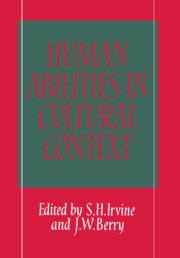Book contents
- Frontmatter
- Contents
- List of contributors
- Preface
- Acknowledgments
- Part I Human abilities in theoretical cultures
- 1 The abilities of mankind: A revaluation
- 2 A triarchic view of intelligence in cross-cultural perspective
- 3 The biological basis of intelligence
- 4 Speed of information processing and population differences
- 5 The factor model as a theoretical basis for individual differences
- 6 The meaning of item bias in ability tests
- Part II Cultural responses to ability measurement
- Part III Cultural limits upon human assessment
- Author index
- Subject index
6 - The meaning of item bias in ability tests
from Part I - Human abilities in theoretical cultures
Published online by Cambridge University Press: 13 January 2010
- Frontmatter
- Contents
- List of contributors
- Preface
- Acknowledgments
- Part I Human abilities in theoretical cultures
- 1 The abilities of mankind: A revaluation
- 2 A triarchic view of intelligence in cross-cultural perspective
- 3 The biological basis of intelligence
- 4 Speed of information processing and population differences
- 5 The factor model as a theoretical basis for individual differences
- 6 The meaning of item bias in ability tests
- Part II Cultural responses to ability measurement
- Part III Cultural limits upon human assessment
- Author index
- Subject index
Summary
Introduction
Psychological tests are widely used in populations other than the one for which they were designed and originally standardised. If a test is transferred to another country, items are often modified or replaced to make the test more suitable for local subjects. In the case of a new population which forms part of the same society, only new norms tend to be established. If a test is used for comparative purposes, either within a culturally heterogeneous society or across countries, no changes in item content are made, but identity of the metric scale formed by the test score variables in the various groups is presupposed.
It can be argued that adaptation of a test does not involve any psychological or psychometric assumptions about the nature of intergroup differences and that problems of equivalence are avoided when no comparisons are made. This is correct only to a certain extent. In a properly conducted restandardisation study, items which do not differentiate between subjects are eliminated or replaced, new norms are established, and the validity of the test is investigated. However, it seems pointless to adapt an existing test (rather than to construct a new one on the basis of theoretical principles), unless it is assumed that the ability measured by the test is shared by the populations concerned.
When only new norms are established, it is implicitly taken for granted that the test content need not be altered; and that the test reflects the same “hypothetical construct” or empirical criterion in the new population.
- Type
- Chapter
- Information
- Human Abilities in Cultural Context , pp. 166 - 184Publisher: Cambridge University PressPrint publication year: 1988
- 15
- Cited by



